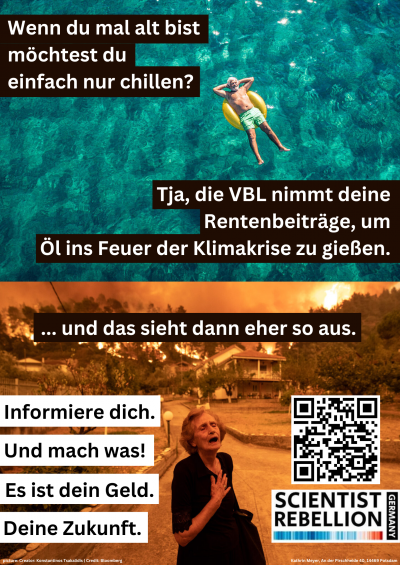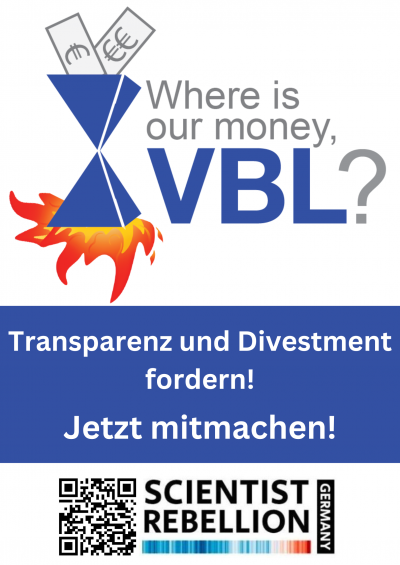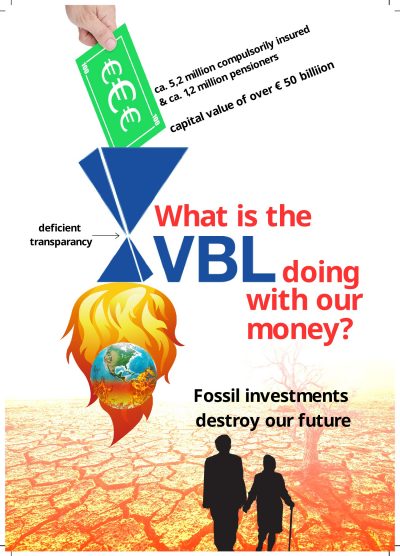Academic life sustains the fossil fuel industry in more ways than you might think.
The compulsory pension fund for civil servants (including academic personnel) shows the extent of the problem.
On this page, you will find information on the VBL pension fund, its investment model, and ways to leverage change.
21st October 2024: Paper pasting action at VBL headquarters
Watch this talk about the VBL issue and a successful pension fund campaign in the Netherlands
Sustainable or not: the VBL is what?
As public sector employees, if we are not employed in Hamburg or Saarland and are not civil servants, we are obliged to pay into the Vermögensanstalt des Bundes und der Länder (VBL). The VBL is the largest supplementary pension scheme for pensions in the public sector [1]. We are among around 5 million people who have contributed to the creation of a massive pension fund totalling around 50 billion euros. That’s a lot of money that fund managers invest in various companies around the world to generate profits from which future pensions will be paid. This means that we have an interest in ensuring that these companies will still be profitable in several decades’ time.
But which companies does VBL invest in? We don’t know. The VBL is scandalously intransparent. This is anything but normal for such a large pension fund. The Norwegian and world’s largest pension fund lists all its investments on its website for everyone to see [2].
So where is our money?
And why is it important to have an insight into the investments that secure our pension? Firstly, for ethical reasons, because we may not want our money to be used to finance exploitation, child labour, weapons production and environmental destruction. Or quite pragmatically for financial reasons, because certain business models may no longer be viable in the future, for example because it is foreseeable that they will be replaced by new technologies or because they violate international agreements.
Fossil fuel companies are a particularly perfidious example because they are the cause of the climate and environmental crisis. Their products are burning our future, in which weather extremes, heat, new diseases, species extinction etc. are becoming increasingly dangerous for us and make a relaxed retirement significantly less likely.
Financial risks also arise when investing in fossil fuel companies. These are described by the “carbon bubble” model. In order to limit global warming to a certain level, only a certain amount of carbon may be released into the atmosphere through the combustion of fossil fuels. However, fossil fuel companies have already acquired the extraction rights for oil, coal and gas reserves that exceed this CO2 budget and have listed these as assets on their balance sheets, meaning that they are potentially overvalued on the financial market. In other words, the carbon bubble is a speculative bubble [3].
Although the climate crisis is not a new problem, the VBL only adjusted its guidelines regarding investments in coal companies due to pressure from the Finanzwende [4] and sustainVBL [5] initiatives, among others. It now excludes companies that have a “predominantly coal-based business model”, i.e. that generate 25% or more of their turnover from coal [6]. However, this means that even investments in RWE – a well-known coal company and Europe’s largest CO2 emitter – are permitted because its coal turnover is just under 25%. This means that the threshold in question practically excludes no European coal company. Furthermore, no companies that trade in oil or gas are excluded. The VBL categorises these as “bridging technologies” [7].
The VBL website has many fine words to say about sustainability. What is still missing, however, is verifiable information on the exclusion of companies. For the reasons mentioned above, we must also demand that VBL no longer invest in fossil fuel companies, including oil and gas companies. The largest pension fund in the EU, the Dutch ABP, has already shown that this is possible [8]. A large number of civil society campaigns have led to ABP completely withdrawing from investments in fossil fuel producers [9].
VBL must also set a good example: as a federal institution supervised by the Federal Ministry of Finance, it must not contradict the government’s own climate targets, it must not actively contribute to the destruction of our livelihoods and it must not unnecessarily jeopardise our pensions. All investments must be disclosed so that they can also be evaluated by the public.
It’s our money. Where is it?
More information
Send an email to the VBL
Finanzwende provides an email sending tool with an already drafted text. The email will be sent to the directors of VBL and Christian Lindner in cc: https://www.finanzwende.de/kampagnen/vbl-for-future
Using this tool is similar to signing a petition. It’ll take you only 3 seconds, but can help to already build up some pressure.
By sending an email to the VBL you express your discomfort regarding their lack of transparency and unsustainable investments.
You let them know that you know!
Get in touch for more you can do!
Sending emails is a valuable puzzle piece, however, alone, it won’t be enough to move the VBL to full transparency and sustainability.
But there is more you can do. Reach out and let’s discuss how to proceed.
Some final words on standing your ground
Obviously the VBL management wants to make their investments appear as green as possible. And they will argue that they are already.
The mechanisms of the finance market are complex, and maybe you think:
“Do I know enough about these issues? Maybe I just don’t understand these mechanisms and they are all normal procedures.”
Thus, it can feel hard to stand your ground and stick to your demands.
But keep in mind:
- If their investments are really that sustainable and ethical, why don’t they disclose them in a transparent way as other European pension funds do? (10)
- It is YOUR money. You worked for it, not them. You should have a right to know what they are doing with it.
- You HAVE TO give it to them. You cannot opt out. In other cases, e.g. when choosing your bank, you have some control and can carefully pick institutions that responsibly handle your money. Since you cannot just leave with your money and wave goodbye to the VBL, we need to have this discussion.
[1] https://www.vbl.de/de/daten-fakten-geschichte
[2] https://www.nbim.no/en/the-fund/investments/#/
[3] https://www.umweltbundesamt.de/sites/default/files/medien/1410/publikationen/2021-07-06_texte_22-2021_carbon_bubble_de.pdf
[4] https://www.finanzwende.de/kampagnen/vbl-for-future/fragen-und-antworten-zur-vbl
[5] https://www.sustainvbl.de/
[6] https://www.vbl.de/de/grunds%C3%A4tze-der-anlagepolitik
[7] https://background.tagesspiegel.de/sustainable-finance/nachhaltigkeitsansatz-mit-schwaechen
[8] https://www.bloomberg.com/news/articles/2024-05-28/europe-s-biggest-pension-fund-sells-10-billion-in-fossil-fuels
[9] https://www.abp.nl/content/dam/abp/nl/documents/Press%20Release%20Fossil_EN.pdf
[10] https://www.umweltbundesamt.de/publikationen/untersuchung-der-finanziellen-performance



